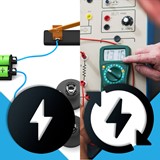Course Overview:
Delivery Options:
Length: 2-days
Percent Hands-on: 75%
Description: This course helps the student gain a solid understanding of the key concepts of basic electricity to allow them to make sense of more advanced topics and build the necessary foundation for success in any instrumentation, electrical, or automation role.
Course Approach:
This course uses a series of thought provoking, visually intuitive, hands-on exercises that allow the students to ‘experiment’ in an open-ended way to directly observe relationships involved in basic electricity and Ohm’s Law, to develop a real, working understanding of the core concepts that underly everything in electrical related fields.
Since these concepts are central to all work in the electrical field and are the root cause of most common weakness in technicians at all skill levels, we focus on making sure that the students truly understand these fundamental concepts in a practical, functional way. A strong foundation is the key to success in the electrical, instrumentation, or automation fields.
Once students fully understand and can intuitively understand the relationships of voltage, current and resistance and the concepts of series and parallel circuits, we begin to apply these concepts in increasingly complex circuits and begin to have the students solve realistic problems.
Students will be given lab challenges in which they strive to predict the results before running or testing various circuits and will analyze and compare their findings to their predictions to help lock in the concepts.
This methodology has proven extremely successful because it allows personnel to learn and fully grasp the underlying concepts and to build upon them in a logical and natural way that aligns with the way that technicians actually learn. We carefully design each course to include extensive hands-on lab exercise where students discover and observe the concepts first-hand and apply the principles learned. The result is greater long-term retention; better ability to use the information in a useful way in the field; and better ability to build upon the information in future learning.
Benefit:
This course is extremely helpful in preparing personnel with minimal or no previous training or experience in electrical area for more advanced training (such as for our Electrical Troubleshooting course or Instrumentation course). Even Journeyman level electricians and technicians typically find this course very valuable and extremely effective at solidifying concepts that were never understood and applied or that which were forgotten over time.
Course objectives:
- Be able to relate physical circuits to wiring diagrams and electrical schematics.
- Intuitively visualize the relationships of current, voltage, and resistance in a circuit (rather than memorizing formulas) via hands-on exercises and demonstrations.
- Understand the relationships of power, energy and wattage in practical ways via hands-on exercises and demonstrations.
- Be able to utilize the concepts associated with Ohm’s Law to solve typical problems in electrical circuits.
- Understand how current and voltages behave in series, parallel, and combination series + parallel circuits.
- Be able to utilize a digital multimeter to properly measure voltage, current, and resistance.
- Be aware of tips and tricks, and common mistakes when using digital multimeters in electrical troubleshooting and maintenance.
- Understand and be able to read and interpret basic electrical schematics, one-line diagrams, and wiring diagrams.
- Gain familiarity with common electrical components.
- Gain practice testing, analyzing, and troubleshooting common simple electrical components such as resistors, potentiometers, rheostats, disconnects, fuses, circuit breakers.
- Learn to test and analyze the operation of key electrical operational components such as switches, indicators, solenoids, relays, motors, capacitors, inductors & inductive loads, etc..
- Understand the basics electrical safety.
Hands-on Exercises
- Construct various series and parallel circuits using our modular quick-connect components such as (switches, resistors, potentiometers, float switches, batteries, power supplies, lamps, relays, fuses, circuit breakers, motors, generators, diodes, LED's, capacitors, etc.).
- Students will predict and then observe the operation of each circuit and solve various problems assigned by instructor.
Course Notes
- Along with TEACHING the material; we are striving to develop the ability for each student to USE the acquired knowledge in a useful way and to continue learning and building upon that knowledge, long after the class ends.
- The number one root cause of all skills deficiencies in the instrumentation and electrical fields is nearly always associated with weaknesses in the fundamental concepts that are covered in this course.
- The skills and concepts covered in this course often make a bigger difference overall for Instrumentation & Electrical personnel than any other training, seminar, or class.
- Many organizations train only on the higher (system) level details - but our years of doing detailed skills assessments show us that the single most common weakness is rooted in a weak understanding of the underlying fundamentals. This course builds the fundamentals, which multiplies the value and impact of subsequent, higher-level training and also allows personnel to learn more on their own.
Related Courses
|
Dates |
Event Details |
Course Title |
Cost |
Register |
|
Oct 13-15, 2025 |
Midland, TX |
$1995 |
Registration Closed |
|
|
Oct 16-17, 2025 |
Midland, TX |
Instrumentation & Calibration (2-days) |
$1295 |
Registration Closed |
|
Oct 27-29, 2025 |
Dallas, TX |
$1995 |
Registration Closed |
|
|
Oct 30-31, 2025 |
Dallas, TX |
Instrumentation & Calibration (2-days) |
$1295 |
Registration Closed |
|
Nov 3-6, 2025 |
Dallas, TX |
$2495 |
Registration Closed |
|
|
Dec 2-4, 2025 |
Houston, TX |
$1995 |
Register | |
|
Dec 6-7, 2025 Dec 13-14, 2025 |
Houston, TX |
Basic Electrical Troubleshooting En español 4-days total over 2 weekends |
$1995 4-day Combo |
|
|
Dec 8-11, 2025 |
Houston, TX |
$2495 |
Register | |
|
Dec 15-18, 2025 |
Houston, TX |
$2495 |
Register |


